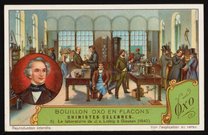Trade card for Libox, Extrait de Viande Assaisonné [Libox, Seasoned Beef Extract] with Franz Karl Achard
- 1929

Rights
Download all 2 images
PDFZIPof full-sized JPGsDownload selected image
Small JPG1200 x 788px — 263 KBLarge JPG2880 x 1891px — 1.2 MBFull-sized JPG2884 x 1894px — 1.2 MBOriginal fileTIFF — 2884 x 1894px — 15.7 MBIllustrated trade card depicts German (Prussian) chemist, physicist, and biologist Franz Karl Achard (1753-1821) walking through a sugar beet refinery, with view of workers illustrating various stages of the production of sugar from beets. The trade card also features an inset bust of Achard. Verso includes an advertisement for Libox's Seasoned Beef Extract, as well as a biography of Achard.
Franz Karl Achard is best known for his discovery of a method for producing sugar from sugar beets. In 1801, with support from King Friedrich Wilhelm III of Prussia, Achard opened the first sugar beet refinery. Notably, the refinery proved vital to Prussia during the Napoleonic Wars of the early 19th century, during which Napoleon placed restrictions on cane sugar imports.
Liebig's Extract of Meat Company was founded in 1865 by Justus von Liebig and George Christian Giebert. While the product was produced exclusively in Uruguay, it was extremely popular in Europe, with 500 tons of the product produced every year in the late 1870's. The company was very successful and eventually was bought by the Vestey Group in 1924. In 1968 the company merged with Brooke Bond and was eventually bought by Unilever in 1984. It was subsequently sold to Premier Foods in 2006.
| Property | Value |
|---|---|
| Publisher | |
| Format | |
| Genre | |
| Medium | |
| Extent |
|
| Language | |
| Subject | |
| Rights | In Copyright |
| Rights holder |
|
| Credit line |
|
Institutional location
| Department |
|---|
Related Items
Cite as
“Trade Card for Libox, Extrait De Viande Assaisonné [Libox, Seasoned Beef Extract] with Franz Karl Achard.” Lithographic ink. Liebig's Extract of Meat Company, 1929. Science History Institute. Philadelphia. https://digital.sciencehistory.org/works/f1881n22k.
This citation is automatically generated and may contain errors.

Trade card for Libox, Extrait de Viande Assaisonné [Libox, Seasoned Beef Extract] with Franz Karl Achard
Rights
Download all 2 images
Searchable PDFmay contain errorsZIPof full-sized JPGsDownload selected image
-
Keyboard Shortcuts
Previous image shift + or , Next image shift + or . Pan image Zoom in + or shift + Zoom out - or shift + Zoom to fit 0 Close viewer esc Also
Mouse click to zoom in; shift-click to zoom out. Drag to pan. Pinch to zoom on touch.





